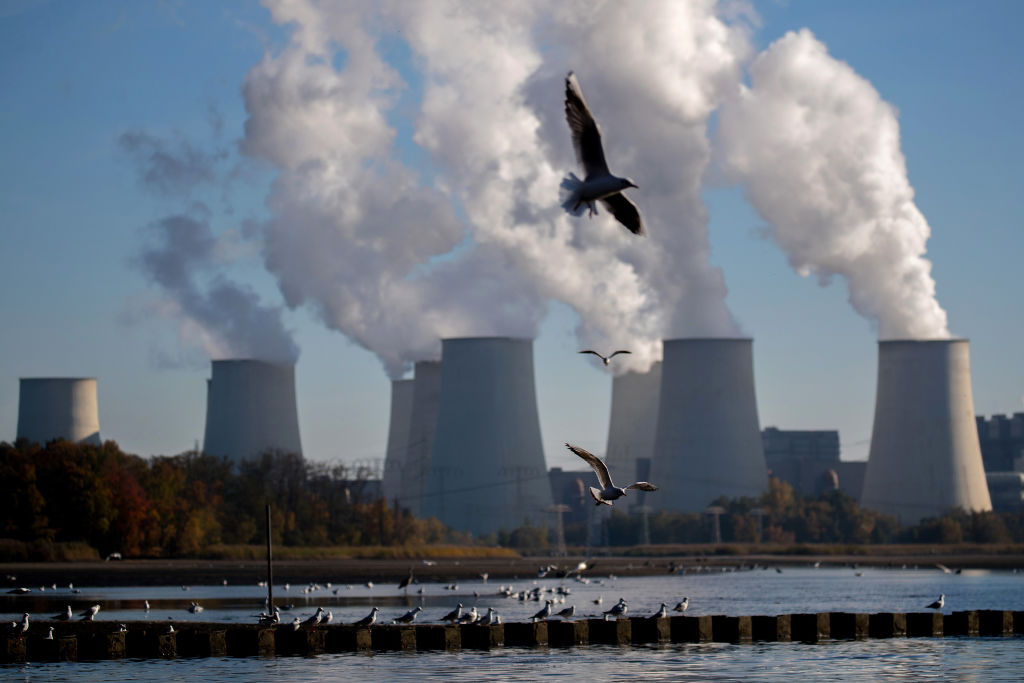
The Group of 20 (G20) summit logo at the Media Centre during the G20 summit in Rome, Italy, October 30, 2021. /Getty
The Group of 20 (G20) summit logo at the Media Centre during the G20 summit in Rome, Italy, October 30, 2021. /Getty
Editor's note: Bradley Blankenship is a Prague-based American journalist, political analyst and freelance reporter. The article reflects the author's opinions and not necessarily the views of CGTN.
As the G20 convenes in Rome this weekend, two major issues are on the top of the agenda: The ongoing COVID-19 pandemic and climate change. While the pandemic is at the forefront of everyone's mind, the latter issue poses an infinitely greater existential threat to organized life and it's for this reason that firm commitments should be made to avoid a catastrophe, as the pandemic proves.
On October 30, Italian Prime Minister Mario Dragi described global vaccine inequity as "morally unacceptable," calling on the G20 to ramp up vaccines to poor countries. However, it seems unlikely that this will turn out to be anything more than just empty promises.
G20 countries represent about 62 percent of the global population but have used an estimated 82 percent of the world's COVID-19 vaccines. In low-income countries, only 3.1 percent of people have received at least one dose. Compared to their G20 counterparts, low-income countries are even struggling mightily to vaccinate their health care and frontline workers - the majority of whom are vaccinated in G20 countries.
While the G20 is a more diverse club of countries that includes highly developed Western countries as well as those that represent the emerging multipolar world, the smaller G7 group, made up of Canada, France, Germany, Italy, Japan, the United Kingdom and the United States, as well as the EU by extension, has fallen well short of its pledged one billion vaccine doses to poor countries.
G7 countries are actually on pace to waste 100 million doses by the end of the year, according to the People's Vaccine Alliance. Meanwhile, countries like India, South Africa and Indonesia have proposed intellectual property waiver but have faced obstruction from some G20 (and also G7) members, even though it would undoubtedly help these countries up their vaccine supplies by hundreds of millions.
Likewise, the G20 seems poised to make these exact same mistakes on the issue of climate change. Leaders from the group are expected to announce a cap on global warming at the 1.5 degree Celsius level scientists agree is essential to avoiding a catastrophe, but a draft communique seen by Reuters reportedly shows no firm commitments on this issue.

Wild birds at a nature sanctuary near the Jaenschwalde lignite-fired power station in Jaenschwalde, Germany, October 28, 2021. /Getty
Wild birds at a nature sanctuary near the Jaenschwalde lignite-fired power station in Jaenschwalde, Germany, October 28, 2021. /Getty
If this is the case, then the ongoing COVID-19 pandemic is really just foreshadowing for what's to come later as the deleterious effects of climate change become more pronounced. This means greater population displacement, increased climate-related deaths, more frequent pandemics and probably also more global conflict as resources, such as water, become scarcer.
As it stands, the G20 is woefully unprepared to lead on these downstream issues, let alone climate change itself, and would only succumb to the same mistakes as the ongoing pandemic. However, the G20 could instead take COVID-19 as a learning lesson to show what doesn't work in the face of this crisis.
The pandemic has made clear that firm commitments and concrete plans from the G20 are needed since promises lead to nothing without them. On the issue of climate change, it's not just about a leadership example but really the fact that the G20 produces the most greenhouse gas emissions in the world, by far. This means that G20 cooperation on climate is essentially a prerequisite to avoiding a catastrophe.
We have also seen without a doubt that charity simply doesn't work and that shoring up emissions will take a more fundamental restructuring of the global economic system, including wealth redistribution, investment in tangible assets like infrastructure, technology-sharing and intellectual property waivers.
Expecting low-income countries to adapt to climate change, while also working on economic development, is unnecessary and unrealistic. It will also compound challenges for developed countries themselves, including with the aforementioned issues of climate-related migration, emerging pandemics and challenges to global security.
As the foremost intergovernmental forum representing the world's largest economies, the G20 has a responsibility to act on all of these issues in meaningful and impactful ways - and to also learn where it counts. The mistakes of the COVID-19 pandemic should be analyzed, corrected and never repeated again.
(If you want to contribute and have specific expertise, please contact us at opinions@cgtn.com.)

